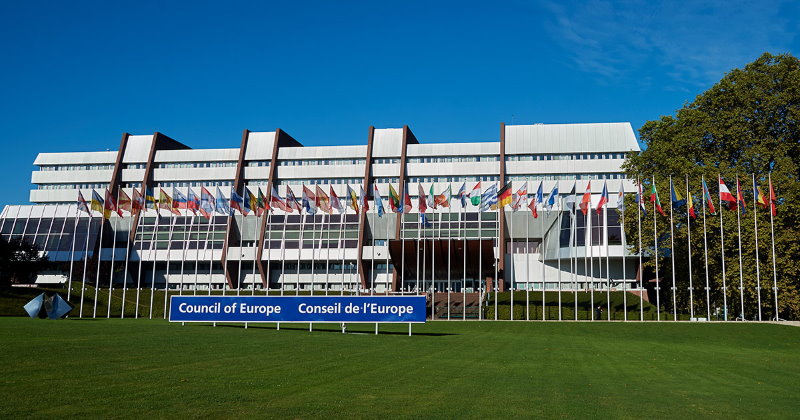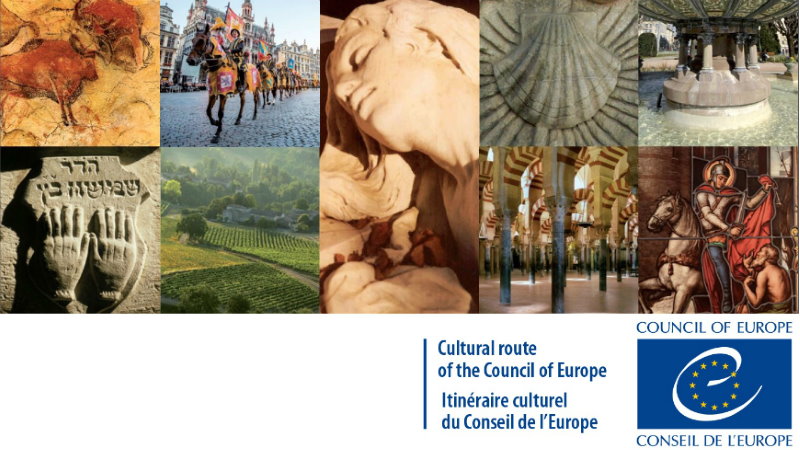Council of Europe Cultural Routes Programme
The Via Francigena was granted a recognition of a “Cultural Route of the Council of Europe” in 1994. The European Association of the Via Francigena Ways (EAVF), created on 7 April 2001, was certified by the Council of Europe as a carrier network of the Via Francigena Cultural Route in 2007. Since that moment the Council of Europe and its Cultural Routes Programme have been strategic institutional partners of the Association.

Council of Europe (CoE)
The Council of Europe, founded in 1949, is the main European organization for the defence of human rights and rule of law and promotion of democracy on the continent. The organization unites 46 countries and 5 observers. All member states of the Council of Europe have signed the European Convention on Human Rights. The organization’s headquarters is in Strasbourg (France). For more information visit the website of the Council of Europe https://www.coe.int/en/web/portal/home.

The Cultural Routes Programme
The Cultural Routes programme was launched by the Council of Europe in 1987 with the Declaration of Santiago de Compostela. The Declaration states the following: “May the faith which has inspired pilgrims throughout history, uniting them in a common aspiration and transcending national differences and interests, inspire us today, and young people in particular, to travel along these routes in order to build a society founded on tolerance, respect for others, freedom and solidarity.” See the full version here https://rm.coe.int/16806f57d6
The principal objectives of the Cultural Routes programme are:
- Promote the European identity citizenship, based on a common set of values;
- Promote intercultural and interreligious dialogue through a better understanding of European history;
- Safeguard and enhance the cultural and natural heritage as a factor for improving the quality of life and as a source of social, economic and cultural development;
- Promote sustainable cultural tourism.
The Cultural Routes Programme is managed by the Enlarged Partial Agreement on Cultural Routes – a specialised department of the Council of Europe and is supported by a technical agency – the European Institute on Cultural Routes, based in Luxembourg since 1997.

Cultural Routes
According to the Resolution CM/Res(2013)66 a Cultural Route is “a cultural, educational heritage and tourism co-operation project aiming at the development and promotion of an itinerary or a series of itineraries based on a historic route, a cultural concept, figure or phenomenon with a transnational importance and significance for the understanding and respect of common European values.”
A Cultural Route operator can be an organisation or a grouping of organisations legally registered in one or several of the Council of Europe member States, or a public institution, which carries the legal, financial and moral responsibility for the management and functioning of a cultural route and represents the route vis-à-vis the Council of Europe. The Via Francigena’s operator is the European Association of the Via Francigena Ways, the Council of Europe’s carrier network. It has a legal form of an international association and unites 179 local authorities and 60 non-profit organizations in England, France, Switzerland and Italy as well as more than 300 private stakeholders in hospitality and tourism sectors.
More information here https://www.viefrancigene.org/en/about-us/.
By 2022 the Council of Europe certified 45 Cultural Routes, crossing 46 Member States of the Organization and far beyond and promoting shared European memory and culture. The Via Francigena, one of the oldest certified Cultural Routes, puts into practice the values of the Council of Europe: human rights, cultural diversity and mutual exchanges across borders. It provides educational activities young Europeans and key resources for responsible tourism and sustainable development.
The routes’ networks, together composed of over 1,600 members, are examples of successful partnerships of public and private stakeholders, representatives of local and regional authorities, associations and private sector.
Certification for the Cultural Route Label
The prestigious Cultural Route Label is granted upon fulfilment of criteria, defined by the Council of Europe.
The principal criteria state that a cultural route candidate should:
- Have a European theme of the route (uniting countries, cultures and traditions);
- European network (establishment of an international association with a minimum 3 members from the CoE member states);
- Respond to 5 priority fields of actions: multidisciplinary research (necessity for the Scientific Committee); enhancement of memory, history and European heritage; contemporary cultural and artistic practice; cultural and educational exchanges for young Europeans; tourism and sustainable development.
The already certified Cultural Routes are a subject of regular evaluation, which occurs every 3 years. Their activities and governance are assessed on the conformity with the Council of Europe criteria for Cultural Routes. More details here.
The EAVF was certified as a carrier network of the Via Francigena route on 9 February 2007. It was a subject of evaluation in 2013, in 2016 and in 2019, and proudly re-confirmed its label of a cultural route.
Evaluation reports:
– 2013 by Prof. Pierre Frustier


